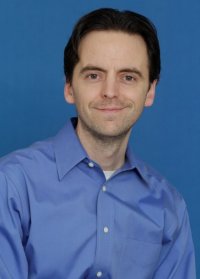David Courson
By Tomeka Wilcher
As a practitioner I have observed the implementation of numerous active learning strategies and instructional models within a classroom of, on average, 25 to 30 students. These may not seem like large numbers, but when the teacher has to plan, teach, and assess to ensure an active learning classroom, the task can be massive.
As I reflect on the time and dedication that a faculty member puts into an active learning classroom, I think of the notable work Dr. David Courson, a lecturer in Old Dominion University's department of chemistry and biochemistry, is doing with his students. I met Dr. Courson at my Gradual Release Model pop-up workshop. As we were discussing perspectives on the effective classroom, he mentioned that he "flips" two of his chemistry classes. In a flipped classroom, the traditional idea of classroom learning is inverted. What blew our minds was that he was flipping a classroom with 231 students! We could not believe this and wanted to hear more. He obliged us as we asked questions, but I wanted to see his methods in real time.
On a Wednesday morning, I was sitting in the midst of 231 engineering and physical science majors in Dr. Courson's CHEM 123N class. Once he had provided students with a brief review of the concepts covered in the previous class, he and his five teacher assistants began moving. The class operated like a well-oiled machine, and the transitions were seamless. As Dr. Courson discussed chemical equilibriums, he modeled how to solve the problem and used the think-aloud strategy. Not only were students watching him work through the problem, they could also hear him and the strategies he used. After he modeled, he gave students a problem to work through on their own or with a peer. As students worked, Dr. Courson and his teacher assistants would circulate through the classroom to lend support and clarify areas of confusion. While this was going on, I overheard two young ladies discussing the quizzes they worked on outside of class and how helpful they were. The quizzes are problem sets designated for each chapter. The questions are pulled from a pool of problems on the same topic. Students never get the same question, and they have the opportunity to take the quiz repeatedly. By the end of class I had gained an appreciation of the work Dr. Courson is doing to support his students, and I wanted to showcase his active learning classroom.
Dr. Courson started flipping his chemistry class last spring. His colleague, Dr. Josh Wallach, produced the video lectures for the course. They also created the activities and problems students have access to on Blackboard and their devices. There is a great deal of frontloading when you are creating a flipped course, but once this is done, the day-to-day is relatively easy. When I talked with him later, Dr. Courson suggested taking a semester to build the course. He also discussed what he had experienced and how his class had evolved because of his willingness to listen to his students and to reflect. He used the feedback from his first flipped class to create a flipped classroom where students are engaged and time is built in for him to dig deeper and work intimately with students to ensure their understanding. Dr. Courson provides conceptual lectures, chunks material, activates prior knowledge, models, incorporates peer interaction and grading, and constantly checks for students' understanding and learning.
Dr. Courson does not flip all his classes, but he tailors them based upon his students' needs. In CHEM 103, an introduction to chemistry course, he uses the interactive lecture to teach content and vignettes that focus on college study skills, learning skills, and resources here at ODU. He also requires these students to see him during his office hours at least once. Dr. Courson describes himself as a military brat and said his father obtained his degree six months before the son received his. Dr. Courson's journey and life experiences help connect him to his students, especially those who are first generation or affiliated with the military.
To gain more insight on the flipped classroom and the many teaching strategies Dr. Courson implements within his classes, I suggest talking with him or observing him in action - or observing some of his colleagues in the department of chemistry and biochemistry. You will be inspired.




